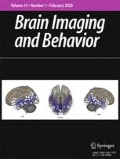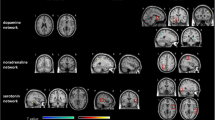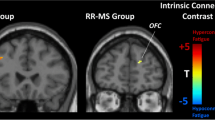Abstract
Prolonged, disabling fatigue is the hallmark of chronic fatigue syndrome (CFS). Previous neuroimaging studies have provided evidence for nervous system involvement in CFS etiology, including perturbations in brain structure/function. In this arterial spin labeling (ASL) MRI study, we examined variability in cerebral blood flow (CBFV) and heart rate (HRV) in 28 women: 14 with CFS and 14 healthy controls. We hypothesized that CBFV would be reduced in individuals with CFS compared to healthy controls, and that increased CBFV and HRV would be associated with lower levels of fatigue in affected individuals. Our results provided support for these hypotheses. Although no group differences in CBFV or HRV were detected, greater CBFV and more HRV power were both associated with lower fatigue symptom severity in individuals with CFS. Exploratory statistical analyses suggested that protective effects of high CBFV were greatest in individuals with low HRV. We also found novel evidence of bidirectional association between the very high frequency (VHF) band of HRV and CBFV. Taken together, the results of this study suggest that CBFV and HRV are potentially important measures of adaptive capacity in chronic illnesses like CFS. Future studies should address these measures as potential therapeutic targets to improve outcomes and reduce symptom severity in individuals with CFS.



Similar content being viewed by others
References
Basalyga, G., & Salinas, E. (2006). When response variability increases neural network robustness to synaptic noise. Neural Computation, 18(6), 1349–1379. https://doi.org/10.1162/neco.2006.18.6.1349.
Boissoneault, J., Letzen, J., Lai, S., O'Shea, A., Craggs, J., Robinson, M. E., & Staud, R. (2016). Abnormal resting state functional connectivity in patients with chronic fatigue syndrome: An arterial spin-labeling fMRI study. Magnetic Resonance Imaging, 34(4), 603–608. https://doi.org/10.1016/j.mri.2015.12.008.
Boissoneault, J., Letzen, J., Lai, S., Robinson, M. E., & Staud, R. (2018). Static and dynamic functional connectivity in patients with chronic fatigue syndrome: Use of arterial spin labelling fMRI. Clinical Physiology and Functional Imaging, 38(1), 128–137. https://doi.org/10.1111/cpf.12393.
Buysse, D. J., Reynolds 3rd, C. F., Monk, T. H., Berman, S. R., & Kupfer, D. J. (1989). The Pittsburgh sleep quality index: A new instrument for psychiatric practice and research. Psychiatry Research, 28(2), 193–213.
Caseras, X., Mataix-Cols, D., Giampietro, V., Rimes, K. A., Brammer, M., Zelaya, F., Chalder, T., & Godfrey, E. L. (2006). Probing the working memory system in chronic fatigue syndrome: A functional magnetic resonance imaging study using the n-back task. Psychosomatic Medicine, 68(6), 947–955. https://doi.org/10.1097/01.psy.0000242770.50979.5f.
Caseras, X., Mataix-Cols, D., Rimes, K. A., Giampietro, V., Brammer, M., Zelaya, F., Chalder, T., & Godfrey, E. (2008). The neural correlates of fatigue: An exploratory imaginal fatigue provocation study in chronic fatigue syndrome. Psychological Medicine, 38(7), 941–951. https://doi.org/10.1017/S0033291708003450.
Chen, J. J., Jann, K., & Wang, D. J. (2015). Characterizing resting-state brain function using arterial spin labeling. Brain Connectivity, 5(9), 527–542. https://doi.org/10.1089/brain.2015.0344.
Clayton, E. W. (2015). Beyond myalgic encephalomyelitis/chronic fatigue syndrome: An IOM report on redefining an illness. JAMA, 313(11), 1101–1102. https://doi.org/10.1001/jama.2015.1346.
Cook, D. B., O'Connor, P. J., Lange, G., & Steffener, J. (2007). Functional neuroimaging correlates of mental fatigue induced by cognition among chronic fatigue syndrome patients and controls. NeuroImage, 36(1), 108–122. https://doi.org/10.1016/j.neuroimage.2007.02.033.
Cook, D. B., Light, A. R., Light, K. C., Broderick, G., Shields, M. R., Dougherty, R. J., Meyer, J. D., VanRiper, S., Stegner, A. J., Ellingson, L. D., & Vernon, S. D. (2017). Neural consequences of post-exertion malaise in Myalgic encephalomyelitis/chronic fatigue syndrome. Brain, Behavior, and Immunity, 62, 87–99. https://doi.org/10.1016/j.bbi.2017.02.009.
Dai, W., Garcia, D., de Bazelaire, C., & Alsop, D. C. (2008). Continuous flow-driven inversion for arterial spin labeling using pulsed radio frequency and gradient fields. Magnetic Resonance in Medicine, 60(6), 1488–1497. https://doi.org/10.1002/mrm.21790.
Evans, S., Seidman, L. C., Tsao, J. C., Lung, K. C., Zeltzer, L. K., & Naliboff, B. D. (2013). Heart rate variability as a biomarker for autonomic nervous system response differences between children with chronic pain and healthy control children. Journal of Pain Research, 6, 449–457. https://doi.org/10.2147/JPR.S43849.
Faisal, A. A., Selen, L. P., & Wolpert, D. M. (2008). Noise in the nervous system. Nature Reviews. Neuroscience, 9(4), 292–303. https://doi.org/10.1038/nrn2258.
Ferreira, M., Jr., & Zanesco, A. (2016). Heart rate variability as an important approach for assessment of autonomic modulation. Motriz: Revista de Educação Física, 22(2), 3–8.
Fukuda, K., Straus, S. E., Hickie, I., Sharpe, M. C., Dobbins, J. G., & Komaroff, A. (1994). The chronic fatigue syndrome: A comprehensive approach to its definition and study. International chronic fatigue syndrome study group. Annals of Internal Medicine, 121(12), 953–959.
Garrett, D. D., Samanez-Larkin, G. R., MacDonald, S. W., Lindenberger, U., McIntosh, A. R., & Grady, C. L. (2013). Moment-to-moment brain signal variability: A next frontier in human brain mapping? Neuroscience and Biobehavioral Reviews, 37(4), 610–624. https://doi.org/10.1016/j.neubiorev.2013.02.015.
Gay, C. W., Robinson, M. E., Lai, S., O'Shea, A., Craggs, J. G., Price, D. D., & Staud, R. (2016). Abnormal resting-state functional connectivity in patients with chronic fatigue syndrome: Results of seed and data-driven analyses. Brain Connectivity, 6(1), 48–56. https://doi.org/10.1089/brain.2015.0366.
Goldstein, D. S., Bentho, O., Park, M. Y., & Sharabi, Y. (2011). Low-frequency power of heart rate variability is not a measure of cardiac sympathetic tone but may be a measure of modulation of cardiac autonomic outflows by baroreflexes. Experimental Physiology, 96(12), 1255–1261. https://doi.org/10.1113/expphysiol.2010.056259.
Hildebrandt, L. K., McCall, C., Engen, H. G., & Singer, T. (2016). Cognitive flexibility, heart rate variability, and resilience predict fine-grained regulation of arousal during prolonged threat. Psychophysiology, 53(6), 880–890. https://doi.org/10.1111/psyp.12632.
Komaroff, A. L., & Cho, T. A. (2011). Role of infection and neurologic dysfunction in chronic fatigue syndrome. Seminars in Neurology, 31(3), 325–337. https://doi.org/10.1055/s-0031-1287654.
Miller, A. H., Jones, J. F., Drake, D. F., Tian, H., Unger, E. R., & Pagnoni, G. (2014). Decreased basal ganglia activation in subjects with chronic fatigue syndrome: Association with symptoms of fatigue. PLoS One, 9(5), e98156. https://doi.org/10.1371/journal.pone.0098156.
Nakatomi, Y., Mizuno, K., Ishii, A., Wada, Y., Tanaka, M., Tazawa, S., Onoe, K., Fukuda, S., Kawabe, J., Takahashi, K., Kataoka, Y., Shiomi, S., Yamaguti, K., Inaba, M., Kuratsune, H., & Watanabe, Y. (2014). Neuroinflammation in patients with chronic fatigue syndrome/Myalgic encephalomyelitis: An (1)(1)C-(R)-PK11195 PET study. Journal of Nuclear Medicine, 55(6), 945–950. https://doi.org/10.2967/jnumed.113.131045.
Okada, T., Tanaka, M., Kuratsune, H., Watanabe, Y., & Sadato, N. (2004). Mechanisms underlying fatigue: A voxel-based morphometric study of chronic fatigue syndrome. BMC Neurology, 4(1), 14. https://doi.org/10.1186/1471-2377-4-14.
Petracca, M., Saiote, C., Bender, H. A., Arias, F., Farrell, C., Magioncalda, P., Martino, M., Miller, A., Northoff, G., Lublin, F., & Inglese, M. (2017). Synchronization and variability imbalance underlie cognitive impairment in primary-progressive multiple sclerosis. Scientific Reports, 7, 46411. https://doi.org/10.1038/srep46411.
Pinneo, L. R. (1966). On noise in the nervous system. Psychological Review, 73(3), 242–247.
Price, D. D., Bush, F. M., Long, S., & Harkins, S. W. (1994). A comparison of pain measurement characteristics of mechanical visual analogue and simple numerical rating scales. [comparative study]. Pain, 56(2), 217–226.
Puri, B. K., Jakeman, P. M., Agour, M., Gunatilake, K. D., Fernando, K. A., Gurusinghe, A. I., et al. (2012). Regional grey and white matter volumetric changes in myalgic encephalomyelitis (chronic fatigue syndrome): A voxel-based morphometry 3 T MRI study. The British Journal of Radiology, 85(1015), e270–e273. https://doi.org/10.1259/bjr/93889091.
Reyes del Paso, G. A., Langewitz, W., Mulder, L. J., van Roon, A., & Duschek, S. (2013). The utility of low frequency heart rate variability as an index of sympathetic cardiac tone: A review with emphasis on a reanalysis of previous studies. Psychophysiology, 50(5), 477–487. https://doi.org/10.1111/psyp.12027.
Rogachov, A., Cheng, J. C., Erpelding, N., Hemington, K. S., Crawley, A. P., & Davis, K. D. (2016). Regional brain signal variability: A novel indicator of pain sensitivity and coping. Pain, 157(11), 2483–2492. https://doi.org/10.1097/j.pain.0000000000000665.
Shan, Z. Y., Kwiatek, R., Burnet, R., Del Fante, P., Staines, D. R., Marshall-Gradisnik, S. M., et al. (2016). Progressive brain changes in patients with chronic fatigue syndrome: A longitudinal MRI study. Journal of Magnetic Resonance Imaging, 44(5), 1301–1311. https://doi.org/10.1002/jmri.25283.
Shirer, W. R., Ryali, S., Rykhlevskaia, E., Menon, V., & Greicius, M. D. (2012). Decoding subject-driven cognitive states with whole-brain connectivity patterns. Cerebral Cortex, 22(1), 158–165. https://doi.org/10.1093/cercor/bhr099.
Sorenson, M., Jason, L., Peterson, J., Herrington, J., & Mathews, H. (2014). Brain Derived Neurotrophic Factor is Decreased in Chronic Fatigue syndrome and Multiple Sclerosis. Neurology & Neurophysiology, 12, S2–13.
Staud, R., Boissoneault, J., Craggs, J., Lai, S., & Robinson, M. E. (2018). Task related cerebral blood flow changes of patients with chronic fatigue syndrome: An arterial spin labeling study. Fatigue: Biomedicine, Health & Behavior, epub ahead of print.
Takahashi, T. (2013). Complexity of spontaneous brain activity in mental disorders. Progress in Neuro-Psychopharmacology & Biological Psychiatry, 45, 258–266. https://doi.org/10.1016/j.pnpbp.2012.05.001.
Thayer, J. F., Hansen, A. L., Saus-Rose, E., & Johnsen, B. H. (2009). Heart rate variability, prefrontal neural function, and cognitive performance: The neurovisceral integration perspective on self-regulation, adaptation, and health. Annals of Behavioral Medicine, 37(2), 141–153. https://doi.org/10.1007/s12160-009-9101-z.
Van Cauwenbergh, D., Nijs, J., Kos, D., Van Weijnen, L., Struyf, F., & Meeus, M. (2014). Malfunctioning of the autonomic nervous system in patients with chronic fatigue syndrome: A systematic literature review. European Journal of Clinical Investigation, 44(5), 516–526. https://doi.org/10.1111/eci.12256.
Wang, Z. (2012). Improving cerebral blood flow quantification for arterial spin labeled perfusion MRI by removing residual motion artifacts and global signal fluctuations. Magnetic Resonance Imaging, 30(10), 1409–1415. https://doi.org/10.1016/j.mri.2012.05.004.
Wang, Z., Aguirre, G. K., Rao, H., Wang, J., Fernandez-Seara, M. A., Childress, A. R., et al. (2008). Empirical optimization of ASL data analysis using an ASL data processing toolbox: ASLtbx. Magnetic Resonance Imaging, 26(2), 261–269. https://doi.org/10.1016/j.mri.2007.07.003.
Wu, W. C., Fernandez-Seara, M., Detre, J. A., Wehrli, F. W., & Wang, J. (2007). A theoretical and experimental investigation of the tagging efficiency of pseudocontinuous arterial spin labeling. Magnetic Resonance in Medicine, 58(5), 1020–1027. https://doi.org/10.1002/mrm.21403.
Wutte, M. G., Smith, M. T., Flanagin, V. L., & Wolbers, T. (2011). Physiological signal variability in hMT+ reflects performance on a direction discrimination task. Frontiers in Psychology, 2, 185. https://doi.org/10.3389/fpsyg.2011.00185.
Yang, H., Shew, W. L., Roy, R., & Plenz, D. (2012). Maximal variability of phase synchrony in cortical networks with neuronal avalanches. The Journal of Neuroscience, 32(3), 1061–1072. https://doi.org/10.1523/JNEUROSCI.2771-11.2012.
Yoshiuchi, K., Farkas, J., & Natelson, B. H. (2006). Patients with chronic fatigue syndrome have reduced absolute cortical blood flow. Clinical Physiology and Functional Imaging, 26(2), 83–86. https://doi.org/10.1111/j.1475-097X.2006.00649.x.
Funding
This study was funded by NIH grant R01 NR014049 and NIH/NCATS Clinical and Translational Science grants UL1 TR000064.
Author information
Authors and Affiliations
Corresponding author
Ethics declarations
Conflict of interest
Author Jeff Boissoneault declares that he has no conflict of interest.
Author Janelle Letzen declares that she has no conflict of interest.
Author Michael Robinson declares that he has no conflict of interest.
Author Roland Staud declares that he has no conflict of interest.
Ethical approval
All procedures performed in studies involving human participants were in accordance with the ethical standards of the institutional and/or national research committee and with the 1964 Helsinki declaration and its later amendments or comparable ethical standards.
Informed consent
Informed consent was obtained from all individual participants included in the study.
Rights and permissions
About this article
Cite this article
Boissoneault, J., Letzen, J., Robinson, M. et al. Cerebral blood flow and heart rate variability predict fatigue severity in patients with chronic fatigue syndrome. Brain Imaging and Behavior 13, 789–797 (2019). https://doi.org/10.1007/s11682-018-9897-x
Published:
Issue Date:
DOI: https://doi.org/10.1007/s11682-018-9897-x




